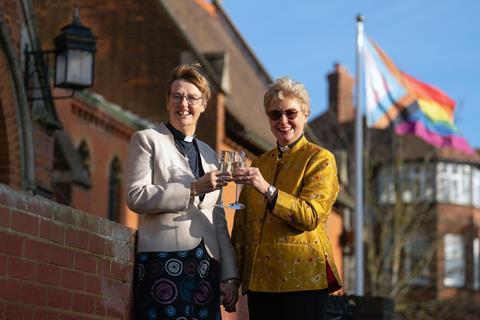Failing to follow good process always results in more problems and more pain. That’s why the Church of England’s wranglings over same-sex blessings are bound to continue, says Rebecca Chapman

This New Year, I managed to take a tumble so impressive that it took 90 minutes to be hoisted to my feet, to be driven to A&E for an X-ray on my back. Four hours later, I was gratefully discharged with a diagnosis of nasty bruising. But back home with my family things weren’t improving as expected, and I had a niggling sense that something wasn’t as it seemed. Four days after my original hospital visit, I received a call from an apologetic consultant explaining that my original X-ray had subtly shown a fracture, and I was urgently required to return to hospital. Somewhere in the hospital’s processes was a review, even of those discharged, to ensure nothing was missed, to ensure everyone was kept safe, and that decisions made with lasting impact were the right ones.
Process isn’t sexy and mention of it may elicit groans, but good process ensures that a series of actions to achieve something are done in the right order, in the right way, and it keeps us all safe in the decision we take. We often don’t notice good process, particularly in a church context - it is like a trellis supporting a stunning plant as it grows – it supports and enables, but we don’t really see it. If the trellis collapses, we barely notice the plant and instead the trellis itself becomes horribly visible in its failure. This week’s new Soul Survivor podcast series will leave us in no doubt of the problems and pain that can follow when good process isn’t followed in our churches.
In November, having abstained in previous General Synod votes on same-sex blessings (feeling desperately caught between theologies, traditions and church ‘worlds’), I voted against the motion put to the Synod on the Prayers of Love and Faith (PLF). I did this primarily because of the concerns I had with the process.
The prayers are so contentious that in October, 11 bishops dissented from the plan. While it can be argued that to now have transparency about the diversity of views at the highest levels of our church leadership is no bad thing, it hardly convinces that the process being followed was working well.
The Church of England has an established process for the authorisation of prayers and liturgy, especially those thought to be divisive or contentious, where they are brought to the General Synod for approval by a two thirds majority. This majority was thought to be unachievable for the PLF, so instead synod was asked to vote on a mash-up of a motion, recognising “progress made” by the bishops on the prayers, but not explicitly linked to the papers supposedly supporting it.
In some ways the vote itself was moot - before the synod, the Bishop of London asserted that the prayers would be commended by the bishops before the end of 2023. The commendation of PLF in this way is also less secure than the formal synodical approval process, especially for the clergy who will be using them. It is clergy who face the risk of legal action if the prayers are later legally found to indicate a departure from the current doctrine of the church.
Frustratingly, we also remain in the dark about the guidance for clergy relationships despite reports that changes to allow priests to enter into same-sex marriages have been drafted. The PLF have been commended and are being used, yet the process is far from over; clergy are left lacking vital legal protection and without clarity about how to order their own lives, even as they are able to better bless other people’s choices. How can this be appropriate support, to keep them safe?
As the process has trolleyed back and forth about the legal method of introducing the prayers, so promises made during it have been equally flexible. Most notably, the Archbishop of York said in February he wouldn’t “be able to support commending these prayers until we have the pastoral guidance and pastoral provision” and then not only commended the prayers months later without either being in place, but used the privilege of his presidential address to promote an amendment to bring forward standalone services using the prayers, rather than limit himself to doing so in a timed speech in the actual debate. “Pay attention to power” was one of the six Pastoral Principles developed in the course of the Living in Love and Faith process, but sadly seems to have been little in evidence here.
Finally, unlike the processes to enable women to become priests and then bishops, while there has been much mention of provision for those who do not wish to use the prayers, we have no clarity on what this means. An October paper from bishops promised “exploration of formal structural pastoral provision in this time of uncertainty” but also that bishops were not advocating for formal structural pastoral provision. A December press release advised that the bishops “will consider pastoral provision to protect the conscience of those who wish to use the Prayers and of those who do not.” Protection for conscience may still be possible, but the prayers are long since commended; the cart is well before the horse. This may be a process, but it is not a good one, nor helping to heal the divisions in our church.
In just under eight weeks, now I have the right diagnosis and care lined up thanks to thorough hospital processes, the doctors tell me my broken back should be almost healed. Mistakes and misdiagnosis can happen, but careful adherence to those processes that may seem somewhat laborious, are what keep patients like me safe and ensures next steps are clear for all. Also in just under eight weeks the General Synod will meet again in Westminster. Whether we can now rebuild trust and move on from this regrettable process mess to some transparent next steps remains to be seen. I shall be praying fervently that the coming weeks bring restoration to both; I feel my broken self even more than normal, and maybe our Church of England does too, but we have a God who is the great healer, able to do miracles. With him, there is always hope.






































2 Readers' comments